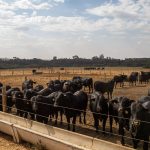In the Dominican Republicthe prices of the food have increased by 80% from July 2023 to July 2024, a growth rate that exceeds by up to 50% that of other goods and services in the Dominican economy.
This was stressed by Jaime Aristy Escuder who indicated, however, that the prices of highly consumed products – such as green beanshe chicken or pork – have remained stable over the same period, because supply has “matched” demand and generated a balance that has resulted in that final price.
- For the economist, these price variations are due to the fact that the agriculture It is a high-risk activity. riskwhose consequences end up being paid for by the producers’ pockets, due to the lack of public policies to help cushion the costs of production.
This is also accompanied by a high margin of intermediation between the producer and the final consumer that impacts prices upwards. “What is happening in the marketIs there any power or ability of any agent of the market of abusing that power or position in the market?,” he questioned.
By participating in a panel of economists within the framework of XXVI National Meeting of Leaders of the Agricultural SectorAristy Escuder proposed the need to increase access to the innovation so that there is greater productivity in it agricultural sectorin order to reduce costs, along with support policies for producers.
“There are no buffer policies. The buffer that is in place Dominican Republic It is the pockets of producers, which for some are not very deep,” he warned.
There is no need to control prices
In this regard, his counterpart, Andrés Dauhajre, described it as “a mistake of macroeconomic policy“the State tries to control prices, because it generates speculationwhile producers’ profits stagnate.
He indicated that the role of the authorities should be to let the market operate under free marketsince it must be seen as an institution that has the capacity self-regulateas happens in other sectors of the economy, and indicated that they should identify why there are such high margins of intermediation.
“That is where the design of the agricultural policyin letting the producers benefit,” he said.
Aristy Escuder agrees with this, pointing out that there are countries that operate without controlling oil prices. marketbut they are busy avoiding a high volatility in prices and in the costa task that should be carried out by the National Institute for Price Stabilization (Inespre), but whose work “has been totally distorted.
Subsidies and exchange rate
Others economists They proposed that more be injected subsidies in the economy to make its profitable production.
For Jose Lois Malkun, the high risks of the agriculture make this activity unprofitable throughout the world and cited the example of the United States, which has been able to obtain technological inputs and improved seeds thanks to state support.
“The agriculture of this country has to face a serious problem of productivityand I believe that the government has to provide all possible facilities in terms of credit“, he stressed, and indicated that the production must be increased “not only for domestic consumption, but also for export.”
In addition to eliminating all price controls, Dauhajre recommended rethinking the exchange rate policy. “There is no sector more harmed by exchange rate controls and price overvaluation than the agricultural sector“, he concluded.
He considered that a control of the exchange rate It goes against a healthy agricultural policy, which should promote “an increasing concentration in the production “of tradable prices.”
“If it is a type of exchange that I am managing through a high real interest rate, when the agricultural sector “If you go looking for financing and you find real interest rates of 8%, it is extremely difficult to be productive and earn money,” he noted.
For his part, Henry Hebrard observed that they must be designed public policies more oriented to generate development in the territories, and make “aggressive investments” in works and infrastructures as basic as local roads, which prevent the introduction of machinery and other technologies into the farms.
He also recommended the creation of financial products that make money available more and more cheaply.
“We need to take advantage of this historic moment, of the structural reformsfor the agriculture“, he emphasized.
Regarding the productivity of the agricultural sector, economist Dauhajre indicated that, if a calculation is made, the agricultural sector feeds an average of 11.7 million people per day, per year, and not 24 million, as the Dominican Agro-Business Board (JAD) has maintained. Therefore, he considered that strategies should be sought to make the activity profitable enough to have the money to import the goods that are needed, so that producers can concentrate on planting the most profitable products. “That is the business,” he stressed.

















